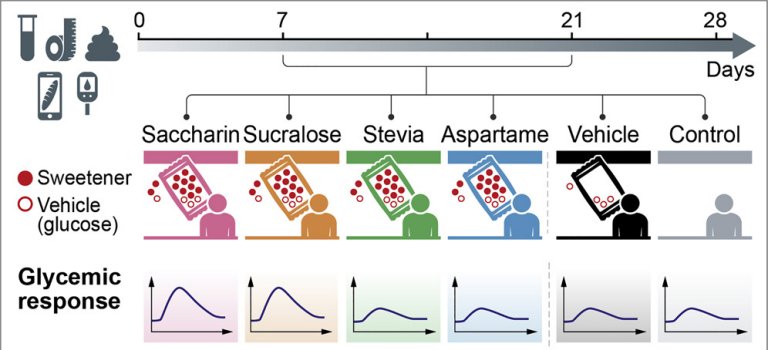09/13/2022
Newsroom in Diario da Sade

The dangers of sweeteners
A large study in France suggested a direct relationship between increased consumption of artificial sweeteners and an increased risk of cardiovascular disease, including heart attack and stroke.
The findings suggest that this food additive, which is widely used as a zero- or low-calorie alternative to sugar, is consumed by millions of people daily and is present in thousands of foods and drinks, should not be considered a healthy and safe alternative to sugar, in line with the current situation of many health agencies.
Several recent studies have linked the consumption of artificial sweeteners or artificially sweetened beverages overweightAnd the Cancer risk And the Converting good bacteria into bad bacteriaBut results remain mixed about the role of artificial sweeteners in causing various diseases, including cardiovascular disease (CVD).
In addition, several observational studies have used consumption of artificially sweetened beverages as an indicator for exploring cardiovascular disease risk, but none have measured the intake of artificial sweeteners in the diet overall.
To investigate this in detail, a team of researchers from the French National Institute of Health and Medical Research (Inserm) in France relied on data from 103,388 participants (mean age 42 years; 80% female). A total of 37% of participants consumed artificial sweeteners, with an average intake of 42.46 mg/day, which is roughly equivalent to a single packet of tabletop sweetener or 100ml of diet soda.
Sweeteners and the heart

During an average follow-up period of nine years, 1,502 cardiovascular events occurred, including heart attack, angina pectoris, angioplasty (a procedure to widen blocked or narrowed arteries in the heart), transient ischemic attacks, and stroke.
The researchers found that total intake of artificial sweeteners was associated with an increased risk of cardiovascular disease, ranging from an absolute rate of 346 per 100,000 person-years in consumers who consumed a lot of the sweetener to 314 per 100,000 person-years in non-consumers. .
Artificial sweeteners were particularly associated with the risk of cerebrovascular disease (absolute rates of 195 and 150 per 100,000 person-years in heavy drinkers and nonusers, respectively).
Aspartame intake was associated with an increased risk of cerebrovascular disease (186 and 151 per 100,000 person-years in heavy drinkers and nonusers, respectively), while acesulfame potassium and sucralose was associated with an increased risk of coronary heart disease (acesulfame potassium: 167 and 164 per 100,000 person-years; sucralose: 271 and 161 per 100,000 person-years in seniors and non-consumers, respectively).
strong evidence
This is an observational study, so it cannot prove a causal relationship, and the researchers do not rule out the possibility that other unknown (confounding) factors may have influenced their results.
In addition, this was a large study that evaluated people’s intake of artificial sweeteners using accurate, high-quality nutritional data, and the results are consistent with other studies linking exposure to artificial sweeteners to various markers of poor health.
Thus, the researchers state that their results do not indicate any benefit of replacing sugar with artificial sweeteners in the incidence of cardiovascular disease.
Article: Artificial sweeteners and cardiovascular disease risk: results from the prospective NutriNet-Sant cohort
Authors: Charlotte Debras, Eloy Chazelas, Laurie Slim, Rafal Borcher, Natalie Druissen Piccolo, Younes Alseddik, Fabian Szabo de Edelene, Cedric Aggas, Alexandre de Sa, Rebecca Lacchia, Leopold K Physio, Chantal Julia, Emmanuel Casey Gayotte Uls, Pilar , Serge Hersberg, Melanie Dechau Tanguy, Ingie Heberchitz, Bernard Srour, Mathilde Topher
Publication: The BMJ
Volume: 378: e071204
DOI: 10.1136 / bmj-2022-071204


“Wannabe internet buff. Future teen idol. Hardcore zombie guru. Gamer. Avid creator. Entrepreneur. Bacon ninja.”

